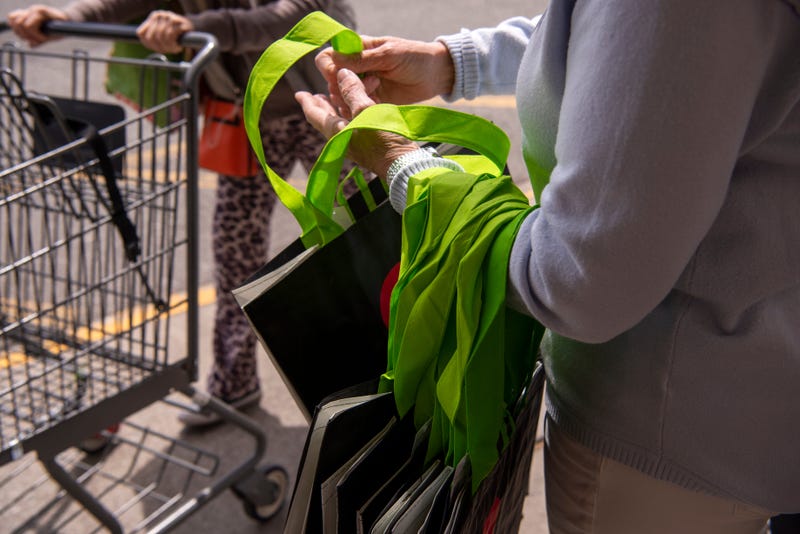
SOUTH JERSEY (KYW Newsradio) — Plastic bag bans across the Delaware Valley have been in effect for some time now, but are they working as intended? Two recent studies paint opposing pictures of their effectiveness.
Delaware retailers are prohibited from providing plastic bags to customers. Although Pennsylvania does not enforce a bag ban statewide, many cities and municipalities have enacted their own rules, including Philadelphia. New Jersey’s bag ban is one of the strictest in the country, banning single-use plastic bags and polystyrene foam food containers.
Shoppers all over are encouraged to bring their own reusable bags or purchase them at checkout — but that may have become a problem in itself.
Matt Seaholm, CEO of the Plastics Industry Association, said thin plastic bags were replaced with thicker reusable ones, designed for multiple uses, but data shows people often throw them away after just one or a few uses.
A report on New Jersey’s bagging behavior by Freedonia Custom Research found that while plastic bag use did drop, alternative bag production climbed exponentially. However, many reusable bags are made with non-woven polypropylene, “which is not widely recycled in the United States and does not typically contain any post-consumer recycled materials,” the study says.
Reusable bags take more energy to make and ship, Seaholm noted, and more plastic is being used overall. Bags made of non-woven polypropylene consume more than 15 times more plastic and generate more than five times as many greenhouse gas emissions than polyethylene plastic bags, data shows.
“If they believe more plastic being used and higher greenhouse gas emissions being produced is a net positive, I don’t know what kind of environmentalism that is,” Seaholm said. “It’s a head-scratcher.”
Stores are raking in millions of dollars from sales of reusable bags rather than providing them for free.
“You might think that as a [plastics] industry we might support that, but absolutely not,” he added. “We would like to see the most sustainable option to be used.”
Two things can be true at once, though. While research shows it takes more plastic to make reusable bags, it’s hard to deny the fact that fewer plastic bags are blowing down the street like urban tumbleweeds.
In fact, some zero-waste advocates say the bans are working quite well. According to a report by the PennEnvironment Research & Policy Center and Frontier Group, bag bans can eliminate nearly 300 plastic bags per person, per year.
The report found bag bans in five high-population locations — New Jersey; Vermont; Philadelphia; Portland, Oregon; and Santa Barbara, California — have cut single-use plastic bag consumption by about 6 billion bags per year.
“Hundreds of millions of single-use bags being eliminated every year, and those are bags that are most likely going to end up in a landfill,” said PennEnvironment zero-waste advocate Faran Savitz. “You’re not going to have as many plastic bags being used and so they can’t become litter; they can’t harm our environment.”
Even if people are buying additional bags to use as trash liners or to pick up dog waste, Savitz said it’s still better for the environment than the previous alternative.
“And we want to design laws to encourage that,” he added.
